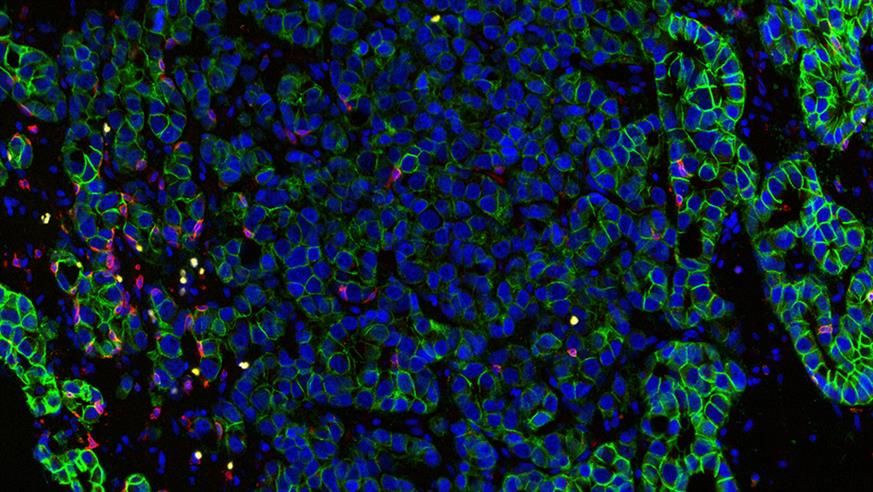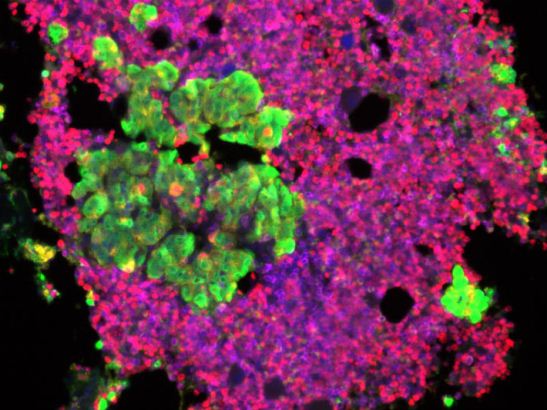
Image: prostate cancer cells. Credit: Mateus Crespo, Ana Ferreira, Daniel Nava Rodrigues and Johann de Bono
Men with faults in the BRCA2 gene have an increased risk of prostate cancer and could benefit from PSA (prostate specific antigen) testing to help detect the disease earlier, according to researchers funded by Cancer Research UK.
Previous studies have shown that PSA is not a suitable test for screening for prostate cancer in the general population, and this remains the case. There are limitations to the PSA test – including false positives, false negatives and overdiagnosis, which is when a cancer would not have gone on to cause harm in a person’s lifetime.
The IMPACT study
But new research, which took place at 65 centres in 20 different countries around the world, found that PSA tests were more likely to pick out more serious forms of prostate cancer in men who carry the BRCA2 gene fault than in non-carriers – suggesting these men could benefit from regular PSA testing.
In the study published today in European Urology, led by researchers at The Institute of Cancer Research, London, looked at around 1,400 men and compared those who do not carry the BRCA2 gene fault with those who do.
The early stages of the research, part of the IMPACT study, were made possible by a generous donation to the ICR from the Ronald and Rita McAulay Foundation.
We have a proven track-record of awe-inspiring research, which is transforming the lives of cancer patients around the world. This work is made possible by an extraordinary community of generous donors, which includes individuals, trusts and foundations and charity partners.
What is the PSA test?
The PSA test looks at the level of prostate specific antigen present in the blood. PSA is a protein produced by normal cells in the prostate and also by prostate cancer cells. It is normal to have a small amount of PSA in the blood, and the amount rises slightly as men get older and the prostate gets bigger. A raised PSA level may suggest a problem with the prostate, but not necessarily cancer.
Men were offered a yearly PSA test and depending on the result, they were either offered a biopsy to confirm their disease, and treated if needed, or asked to come back the following year.
BRCA2 and prostate cancer risk
The researchers found that men who carry the BRCA2 gene fault were almost twice as likely to be diagnosed with prostate cancer than non-carriers.
They also found that carriers were diagnosed at a younger age – an average of 61 compared with 64 in non-carriers.
Importantly, men with the BRCA2 gene fault were diagnosed with more serious tumours –with 77% of men having clinically significant disease compared with 40% of non-carriers.
We identified the breast cancer gene BRCA2, which enabled families with a history of breast cancer to be assessed for future risk, and laid the groundwork for developing novel forms of therapy for BRCA-associated cancers.
Limitations of PSA testing
The study was not able to look at whether PSA testing reduced the number of men who died from prostate cancer, which is needed to prove the value of screening in any group.
There are many different things that can raise PSA levels, including an enlarged prostate, certain medications, urinary tract infections or recent ejaculation.
And receiving a false positive result can lead to unnecessary worry and unnecessary biopsies.
This research provides more evidence that the BRCA2 fault increases the risk of prostate cancer in men and shows that a better test is needed to diagnose them.
Changing future guidelines to save lives
The BRCA1 and 2 genes, are linked to an increased risk in breast and ovarian cancer. But it’s less well known that the BRCA2 fault also increases the risk of prostate cancer, although we do not know by exactly how much.
Estimates are around 1 in 300 white men carry the gene fault, but only some of them will go on to develop prostate cancer.
Following this publication, the researchers plan to submit an application to the European Association of Urology’s guidelines committee so that they can consider making a Europe-wide recommendation for all men over 40, who carry the BRCA2 mutation, to have an annual PSA test.
Early diagnosis and treatment of prostate cancer
Study leader, Professor Rosalind Eeles, Professor of Oncogenetics at The Institute of Cancer Research, London, and Consultant Clinical Oncologist at The Royal Marsden NHS Foundation Trust, said:
“For women who undergo genetic testing, options are available to them if they carry a BRCA fault, including preventative surgery and increased screening. But there’s no prevention pathway in place if men decide to find out if they’re a carrier. Which is why our research is so important.
“Men may get tested for the BRCA fault due to a family history of breast cancer, as they could pass the gene onto their children, which is especially significant if they have daughters. And our research offers this group of men more insight into their own health.
“Based on our results, we would recommend offering men who carry a fault in the BRCA2 regular PSA tests, so that they can be diagnosed and treated earlier.”
